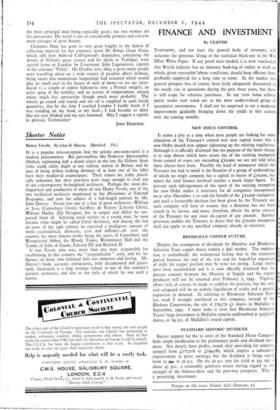FINANCE AND INVESTMENT
By CUSTOS EVERYBODY, and not least the general body of investors, will welcome the generous lifting of the statistical black-out in the War Effort White Paper. If any proof were needed, it is now vouchsafed that British industry has an immense back-log of orders to work on which, given reasonable-labour conditions, should keep efficient firms profitably employed for a long time to come. In the market this general prospect has, of course, been fairly adequately discounted in the steady rise in quotations during the past three years, but there is still scope for selective purchases. In my view home railway junior stocks now stand out as the most under-valued group of speculative investments. I shall not be surprised to see a moderate improvement gradually bringing down the yields in this section over the coming months.
NEW ISSUE CONTROL
It seems a pity at a time when most people are looking for some relaxation of the Treasury's control over new capital issues that a new Order should now appear tightening up the existing regulations. Although it is officially disclosed that the purpose of the latest change is to stop abuses which have arisen out of the existing exemption from control of issues not exceeding £ro,000, we are not told what these abuses have been. Possibly the kind of manoeuvre which the Treasury has had in mind is the flotation of a group of undertakings of which no single company has a capital in excess of £zo,000, but where the total finance involved reaches a much larger figure. To prevent such infringements of the spirit of the existing exemption the new Order makes it necessary for all companies incorporated on or after December x to seek the benefit of the £xo,000 exemption, and until a favourable decision has been given by the Treasury any such company will have to assume that a direction has not been issued in its favour, and must, therefore, obtain the prior consent of the Treasury for any issue of. capital of any amount. Another provision enables the Treasury to direct that the £ro,000 exemption shall not apply to any specified company already in existence.
RHODESIAN COPPER FUTURE Despite the resumption of dividends by Mufulira and Rhodesian Selection Trust copper shares remain a dull market. The explana- tion is undoubtedly the widespread feeling that in the transition period between the end of the war and the hoped-for expansion of trade the copper position may be none too strong. Large stocks have been accumulated and it is now officially disclosed that the present contract between the Ministry of Supply and the copper producers will not be renewed after February r, x945. Vigorous efforts will, of course, be made to stabilise the position, but the only real safeguard will be an orderly liquidation of stocks and a general expansion in demand. In referring. to Rhodesian Selection Trust last week I wrongly attributed to this company, instead of the Rhokana Corporation, the sale of 279,270 Li shares in Mufulira in September, 1943. I must make it clear that Rhodesian Selection Trusts' large investment in Mufulira remains undisturbed at 3,132,218 shares, or 64 p.c. of Mufulira's issued capital.
STANDARD MOTORS' DIVIDEND
Recent support for the 5s units of the Standard Motor Company finds ample justification in the preliminary profit and dividend state- ment. Not merely have profits, struck after providing for taxation, jumped from £177,I18 to £199,286, which implies a substantial improvement in gross earnings, but the dividend is being raised from 25 p.c. to 3o p.c. On the 3o p.c. rate the yield at 33s. 6d. about 41 p.c., a reasonably generous return having regard to t strength of the balance-sheet and the post-war prospects. This
a promising investment.


























 Previous page
Previous page